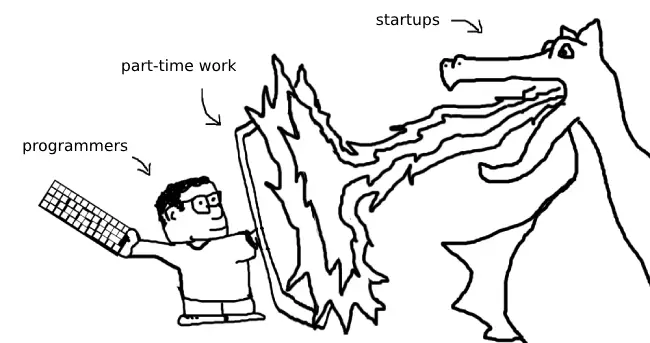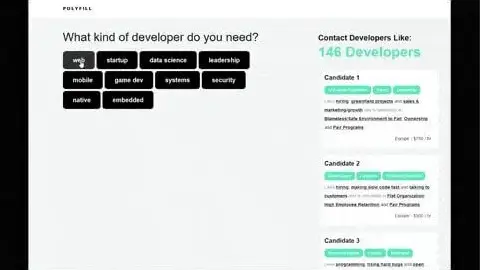
I have spent 6 of the last 12 years working stable, part-time jobs. I like and dislike the obvious things — more time with my kids, less money, more time for side projects, less career growth, less work stress, more layoff risk, less time in meetings, more time wondering what everyone is saying about me in meetings — but I’ve come to appreciate the broader impact that working part-time has on my life and my work.
An Alternative to Going All-In on Startups and Side Projects
I have a hard time doing only one thing. I know this is not true of everyone, but when I work full-time, I’m frustrated that I can’t spend time on personal projects without sacrificing other important parts of my day. However, when I take a break from working full-time to focus on a personal project, I begin to worry more about money and the future (much more so now that I have children). I start seeing reminders of the time value of money everywhere I look.
Working part-time has become a viable third alternative to going all-in on a project by raising money or self-funding. Some personal projects — like making a game — take a lot of time but aren’t good candidates for investment or bootstrapping, because they carry a lot of development risk and aren’t likely to make any money. I’m actually pretty sure the game I’m working on right now won’t make any money, because it’s free.
Even some more traditional, less risky startups benefit more from survival than they do from money alone, like building and maintaining an audience. Working part-time allows me to keep an idea alive long enough to (let’s be honest) invalidate it, regardless of however long I thought that would take when I started (no time at all, probably!).
Learning Broadly and Deeply
Despite my constant (probably unhealthy and definitely untreated) yearning to work on my own thing, I genuinely like working for companies that aren’t my own. I get to learn from people who know more than me while working in unfamiliar domains. I learn skills I’m not likely to get from starting companies and side projects, like how to mentor junior developers, how to hire, how to deal with grumps, and how to auto-forward the CEO’s emails to the trash bin for a year without him noticing. Also, they pay you!
I’ve found that both my professional work and my personal projects benefit from this broad exposure. I’ll occasionally be able to transfer something I’ve learned from hiding latency in a networked game to my employer’s web client/API networking layer, or take math I’ve learned from the data science team and use it in game programming. Watching good CEOs pitch or sell has shown me that hey, that’s a thing, I should learn that thing for my startup.
Also, you meet people, and you can become friends with them or work with them later, or both. Hi Ryan!
Stability and Identity
I’ve found that I switch jobs less often when I’m working part-time. I think there are a few reasons for this:
- It’s probably my ideal state of working so I’m more content/less anxious.
- I don’t hate my job because I’m not doing it all the time. This also means that if there are bad things about my job, I’ll tolerate them longer, because they take up less of my day.
- Stable part-time work is relatively difficult to find so I’m less likely to hear about better opportunities and switch jobs. This is not usually the case when you’re open to full-time work.
- While there’s probably higher layoff risk, as a lower overall cost to your employer perhaps you are sometimes safer than full-time employees. I don’t know though, seems like the part-timers would be the first go. Let's agree that by leaving this flimsy idea here all employers will be convinced that they should let their full-time people go first. Bullet point complete!
One big benefit to working part-time that I did not anticipate (I am not a bright man) was that I no longer struggle to maintain an identity separate from my work, regardless of how engaging or consuming it may be. I don’t know how common this is, but often when working full-time I begin to associate myself more and more with my team or company or project, especially if the work is interesting and the company is at an exciting stage.
This tendency is insidious for me because it affects my ability to give my children, partner, and friends the quality attention they deserve, and that I want to give them. My attention is elsewhere and my identity becomes more one-dimensional and less interesting.
When I’m working part-time I’m naturally changing contexts more often. The two things I’m doing become just two of the many that help define me. Clearly my identity is none of those things alone, but some weird blob-like combination of all of them with a face, and a hat if it’s sunny out.
Balancing Work-Life Balance and your Life’s Work
The free time and forced autonomy that comes from working part-time has helped me be more deliberate about where I put my attention. I get to choose between spending time with friends and family and working on side projects. It turns out this flexibility is essential for me: some days I want to take my girls to the park all afternoon, and some days I want to work on my game’s party-matchmaking system’s dedicated game server controller’s concurrency model until it’s exactly right.
I’ve long felt some kind of internal struggle about why, if I’m such a proponent of Work-Life Balance for others — especially when I’m managing people — do I myself like to spend so much of my free time working? Thankfully, John Carmack sorted this out for me:
... Work-Life Balance versus your Life's Work, where there's a small subset of the people that can be very happy being obsessive about things and, you know, obsession can often get things done that just practical, prudent, pedestrian work won't, or at least, won't for a very long time.
From https://lexfridman.com/john-carmack/
That’s not me all the time — I’m certain I want to work less than Carmack and that, for humanity’s sake, that’s okay — but it is me some of the time. Working part-time helps me choose when those times are and balance them with the rest of my life. Making a networked physics game in your free time is hard (for me), especially if you want to spend a lot of time with your young children, so more free time and the occasional late night or early morning are often rewarding for me and fit nicely into the rest of my life.
I think that because I have some agency over my time and I like what I'm doing, burnout risk is low. Carmack discusses this too, attributing his avoidance of burnout to always having a variety of interesting things to work on:
I have literally never felt burnout, and I know there's lots of brilliant, smart people that do world-leading work that get burned out, and it's never hit me. I've never been at a point where I'm like I just don't care about this, I don't want to do this anymore. But, I've always had the flexibility to work on lots of interesting things. I can always just turn my gaze to something else and have a great time working on that. So much of the ability to actually work hard is the ability to have multiple things to choose from and to use use your time on the most appropriate thing.
From https://lexfridman.com/john-carmack/
Working part-time has definitely helped me here. I don’t think I’ve ever felt burnout either, and that is probably due, at least in large part, to being lucky enough to always having several interesting things to do, whether that’s different projects, family, friends, or hobbies. I also haven’t written a bunch of game engines from scratch so this could be like a penguin agreeing that no, the water is not too cold, don’t worry about it, just get in there!
Finding Part-Time Programming Jobs
I still don’t know how to reliably find part-time work, in general. It’s the kind of thing you want to bring up at the beginning of any hiring process to save everybody time, but that will also probably slow or stop an employer’s interest in working with you (even in cases where they otherwise would be okay with you working part-time).
So far I’ve found all of my part-time software work through one of three ways:
- Start full-time and transition to part-time
- Contact former employers/partners (or former coworkers with new employers) and ask to work part-time
- Work with a demand-led consulting firm like forward
My first part-time job was an accident. I was working full-time for a digital media company and I wanted to take a break and learn game development. When I quit, they offered me a raise, so I asked if I could work two days a week instead. I worked there for another year and a half after that.
Another part-time job came through Forward, and the one after that was from direct contact by a former partner of a previous employer.
I suspect there are more employers open to hiring part-time developers than I see advertised on job boards, but it's difficult to find out, so I focus on companies in my personal network and determining how I can have a meaningful impact in 10 to 20 hours per week. It's a different process than a typical job search: I spend more time convincing someone that I can have an impact in 20 hours and less time convincing them that I can have an impact, period.
I'm hoping to use Polyfill to match developers who are only available part-time with employers who will benefit from hiring them, by showing them how their candidate search criteria affects who they reach. If it works well, I'll use it myself, and this section will be a lot less meandering in the future.
Polyfill matches developers and employers together
Developers find jobs they actually want.
Employers reach developers who want to hear from them.

